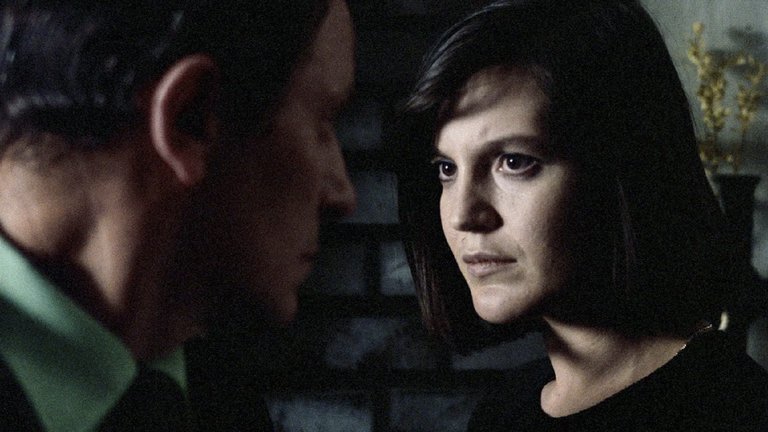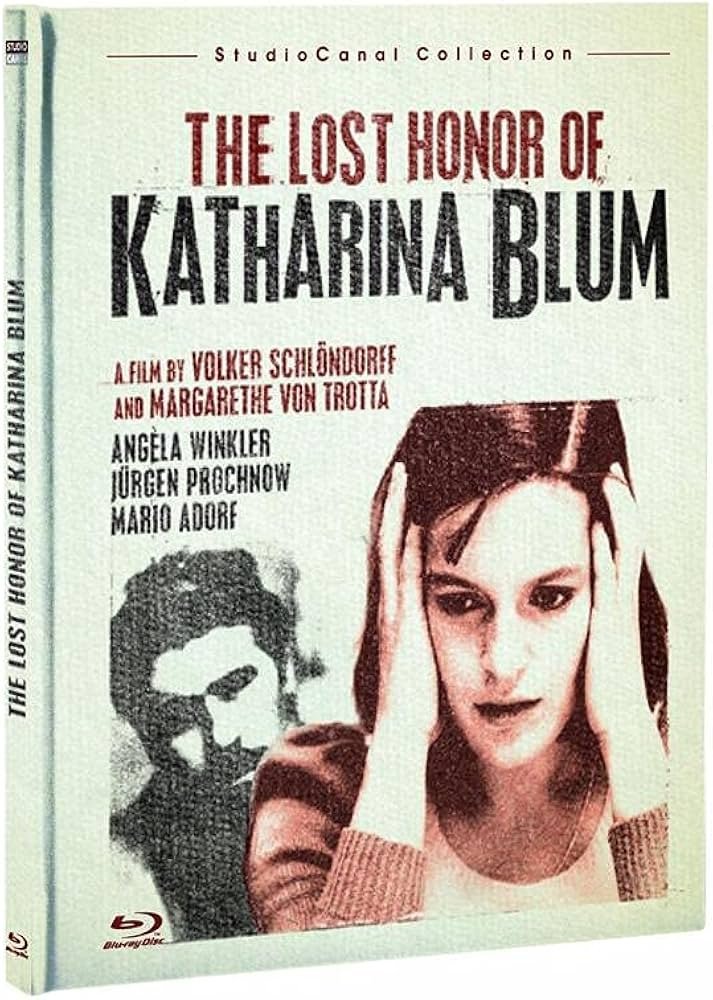The Lost Honour of Katharina Blum (1975): the danger of the media | el peligro de los medios

Like many others, I had this film on my list for some time. In fact, I'd had it on my list for so long that I couldn't even remember what it was about or why I'd added it to my to-read list. But then, a week ago, while visiting a public library, I came across a novel with the same title as the film. Upon reviewing the information, I discovered that the film is based on one of the most celebrated works by German writer and Nobel Prize winner for Literature, Heinrich Böll. So I took the book home and, after finishing it, finally decided to watch the film.
Como muchas otras, tenía esta película en mi lista hacía algún tiempo. Es más, hace tanto tiempo que la tenía en lista que ni siquiera recordaba de qué trataba o por qué la había agregado a mis pendientes. Pero entonces, hace una semana, mientras visitaba una biblioteca pública, me topé con una novela que llevaba el mismo título que el film y al revisar la información descubrí que la película se basa en una de las obras más celebradas del escritor alemán, ganador del Premio Nobel de Literatura, Heinrich Böll. Así que me llevé el libro a casa y después de terminarlo me dispuse a ver, por fin, la película.
Die Verlorene Ehre der Katharina Blum oder (The Lost Honour of Katharina Blum) begins with some people attending a party where the woman of the title meets a man named Ludwig and after dancing and talking they leave together for her apartment. The next morning the police break into Katharina's apartment looking for Ludwig, who turns out to be a criminal accused of bank robbery and dangerous and terrorist affiliations. But the fugitive has left in the early hours of the morning without the uniformed police noticing, so they begin to suspect Katharina and search the entire apartment and take her into custody for questioning. The problem is that the whole procedure, both the detention and the interrogation, is carried out in a clumsy way to say the least. Without the necessary tact and delicacy to treat a woman who has worked all her life as a maid and who, you can see it from a mile, doesn't represent any kind of threat to the ten policemen who escort her, Katharina is treated as a criminal, as if she were already guilty of what she is accused of, even before she has been interrogated. But the seriousness of the matter is not only the way the police act, but - and above all - the way the press deals with the issue and informs the community. To speak of sensationalism would be insufficient to explain the way the news was covered by at least one of the city's newspapers - one of the most widely read, by the way - which began, from the very beginning, to destroy Katharina's public image by distorting statements and providing false information.
Die Verlorene Ehre der Katharina Blum oder (The Lost Honour of Katharina Blum) inicia con unas personas que asisten a una fiesta en donde la mujer del título conoce a un hombre llamado Ludwig y después de bailar y conversar se marchan juntos al apartamento de ella. A la mañana siguiente la policía irrumpe en la vivienda de Katharina buscando a Ludwig, quien resulta ser un criminal acusado de robar bancos y de afiliaciones peligrosas y terroristas. Pero el prófugo se ha marchado en la madrugada sin que los uniformados lo notaran, ¿cómo fue posible?, así que comienzan a sospechar de Katharina y requisan todo el departamento y se la llevan detenida para interrogarla. El problema es que todo el procedimiento, tanto la detención, como el interrogatorio, se lleva a cabo de una manera torpe por decir poco. Sin el tacto ni la delicadeza necesaria para tratar a una mujer que ha trabajado toda su vida como sirvienta y que, se nota a leguas, no representa ningún tipo de amenaza para la decena de policías que la llevan escoltada, Katharina es tratada como una criminal, como si ya fuese culpable de lo que se le acusa, incluso antes de haber sido interrogada. Pero la gravedad del asunto no es sólo la forma de actuar de la policía, sino - y sobre todo - la forma en que la prensa se dedica a tratar el tema y a informar a la comunidad. Hablar de amarillismo o sensacionalismo, sería insuficiente para explicar la forma de cubrir la noticia de al menos uno de los periódicos de la ciudad - de los más leídos, por cierto - que comienza, desde el inicio, a destruir la imagen pública de Katharina tergiversando declaraciones y aportando información falsa.

There's a saying that goes "He who owes nothing, fears nothing"; and at first, Katharina isn't afraid of being accused because she hasn't done anything wrong, right? But then, between the accusations, disguised as suspicion, from the police and the statements that appear in the newspaper, the woman begins to understand that her reality doesn't seem to correspond to the truth and that the truth of the facts isn't always the most important thing. Against the reality of things, there arises the shadow of what they appear to be and what others want to see in them; and when power is in the hands of those others, we begin to feel frustrated and helpless.
Existe un refrán que dice "El que nada debe, nada teme"; y al principio Katharina no tiene miedo de ser inculpada porque no ha hecho nada malo, ¿cierto? Pero entonces, entre las acusaciones, disfrazadas de sospecha, de la policía y las declaraciones que aparecen en el periódico, la mujer comienza a entender que su realidad no parece corresponderse con la verdad y que no siempre la verdad de los hechos es lo más importante. Frente a lo que las cosas son, se erige entonces la sombra de lo que parecen ser y de lo que los demás quieren ver en ellas; y cuando el poder está en manos de esos otros, comenzamos a sentirnos frustrados e indefensos.
However, the plot must be understood in its context. After World War II, Europe was divided into two political and ideological poles. On one side was the USA, with its capitalism and its allies, countries like France and England; and on the other side was the USSR and its socialist partners like Cuba and many countries in what is now Eastern Europe were part of the Soviet Union at the time. The continent and the world were divided in that period known as the Cold War and that division was never as clear and as bitter as in Germany, a country where a wall was erected that divided its citizens for decades, leaving on one side the FRG (Federal Republic of Germany) and on the other the GDR (German Democratic Republic). It was a tense time of ideological struggles, of spies, of suspicions, of listening to other people's conversations and of investigating anyone who seemed suspicious of being affiliated with the factions opposed to the official ones in the territory. On both sides, a myriad of actions were carried out which, in the name of national security, left much to be desired. There was no tolerance for traitors or those who were not one of our own or who had anything to do with the neighboring country (even though it's the same country). Ludwig is accused of being a terrorist precisely in this context and, by extension, Katharina, who only met him the night before, begins to be treated in the same way. Then, the slightest details of the woman's life are publicly displayed and are - for the authorities - confirmation that she has stronger and older links with the criminal, to which she replies that no, she didn't know him before, that yes, she fell in love with him in one night... but everything makes her suspicious, for the police, the press and the community.
Ahora bien, hay que entender la trama en su contexto. Después de la segunda guerra mundial, Europa se vio dividida en dos polos políticos e ideológicos. De un lado estaban los EEUU, con su capitalismo y sus aliados, países como Francia e Inglaterra; y del otro estaba la URSS y sus compañeros socialistas como Cuba y muchos países de lo que hoy es Europa del Este formaban parte de la Unión Soviética entonces. El continente y el mundo estuvieron divididos en ese período que se conoció como la Guerra Fría y esa división nunca se vio tan clara y tan amarga como en Alemania, país en donde se erigió un muro que dividió a sus ciudadanos durante décadas, dejando de un lado a la RFA (República Federal Alemana)y del otro a a la RDA (República Democrática Alemana). Fue una época tensa, de luchas ideológicas, de espías, de sospechas, de escuchar conversaciones ajenas y de investigar a cualquiera que pareciera sospechoso de estar afiliado a las facciones opuestas a las oficiales en el territorio. De uno y otro lado se llevaron a cabo una infinidad de acciones que, en nombre de la seguridad nacional, dejaron mucho que desear. No había tolerancia con los traidores ni con aquellos que no fueran uno de los nuestros o que tuvieran algo que ver con el país vecino (sin importar que fuera el mismo país). Ludwig es acusado de terrorista precisamente en este contexto y, por extensión, Katharina, quien apenas lo conoció la noche anterior, comienza a ser tratada de igual manera. Entonces, los más mínimos detalles de la vida de la mujer son exhibidos públicamente y son - para las autoridades - confirmación de que ella tienen nexos más fuertes y antiguos con el criminal, a lo que ella responde que no, que no lo conocía de antes, que sí, que se enamoró de él en una noche... pero todo la hace sospechosa, para la policía, la prensa y la comunidad.

Böll's book is an interesting blend of police report and journalistic dossier. An unidentified external narrator builds the story by presenting statements from those involved, newspaper articles, and so on; but the film, written and directed by Volker Schlöndorff and Margarethe von Trotta, employs a more uniform narration and adds some sequences that serve to frame and introduce certain events and characters. In my opinion, it's a good adaptation because, despite changing the type of narration, it remains faithful to the essence of the story.
El libro de Böll es una mezcla interesante de reporte policial y dosier periodístico. Un narrador externo, no identificado, va construyendo la historia mostrando las declaraciones de los involucrados, los artículos de prensa, etc; pero la película, escrita y dirigida por Volker Schlöndorff y Margarethe von Trotta emplea una narración más uniforme y agrega algunas secuencias que sirven para enmarcar e introducir algunos hechos y personajes. En mi opinión es una buena adaptación porque a pesar de cambiar el tipo de narración, es fiel a la esencia de la historia.
However, I admit that I prefer the editing of the novel. Böll starts the narrative with the end of the story and then breaks it down to show us the facts, the dates and the way everything led to that tragic closure. In the film, the story is more linear and except for a few flashbacks, everything marches forward, losing some of the dynamism of reading the book, but gaining that growing tension that explodes at the end. The Lost Honour of Katharina Blum is a film that serves to reflect on issues such as justice, respect for private life, the line that separates a protective state from a controlling one, on the female condition and what a society expects from a woman; and of course on the impunity of the media to publish uncorroborated or deliberately invented information. And if this last point was valid for the seventies, it's even more so today when, to get a like, a retweet, or a story on an app, there are profiles and accounts that publish anything without citing any source. Once the information has gone viral, it's discovered that things were not as they were told, but there's no one to hold accountable. Not even the most renowned media escape from this dynamic of seeking visits and likes by compromising the truth, the right to be informed or failing to cover news that could generate reprisals from the rich and powerful. Now we have more tools to inform ourselves, but we live immersed in the culture of cancellation and in a time when things are judged by their virality and not by their importance, what would Heinrich Böll say if he were alive? have any of you seen this movie I read you in the comments?
Sin embargo, reconozco que prefiero el montaje del la novela. Böll inicia la narración con el final de la historia y luego la va desglosando para mostrarnos los hechos, las fechas y la forma en que todo condujo a ese trágico cierre. En la película, la historia es más lineal y salvo algunos flashbacks, todo marcha hacia adelante, perdiendo algo del dinamismo de la lectura del libro, pero ganando esa creciente tensión que estalla al final. The Lost Honour of Katharina Blum es una película que sirve para reflexionar sobre temas como la justicia, el respeto por la vida privada, la línea que separa un estado protector de uno controlador, sobre la condición femenina y lo que una sociedad espera de una mujer; y por supuesto de la impunidad de los medios de comunicación para publicar información no corroborada o deliberadamente inventada. Y si este último punto estaba vigente para los años setenta, lo está aun más hoy en que, por obtener un like, un retweeet, o una historia en una app, hay perfiles y cuentas que publican cualquier cosa sin citar ninguna fuente. Una vez viralizada la información, se descubre que las cosas no eran como se contaron, pero no hay nadie a quien responsabilizar. Ni siquiera los medios de comunicación más reconocidos escapan de esta dinámica de buscar visitas y likes comprometiendo la verdad, el derecho a estar informados o dejando de cubrir noticias que pudieran generar represalias de parte de los ricos y poderosos. Ahora tenemos más herramientas para informarnos, pero vivimos inmersos en la cultura de la cancelación y en una época en que se juzgan las cosas por su viralidad y no por su importancia, ¿qué diría Heinrich Böll si estuviera vivo? ¿alguno de ustedes ha visto esta película Los leo en los comentarios?
Reviewed by | Reseñado por @cristiancaicedo
Other posts that may interest you | Otros posts que pueden interesarte:
  |
|---|




No he visto esta película pero me gusta este genero de instigación policial, FBI, asesinatos. Gracias por la recomendación.
Saludos @cristiancaicedo
No había escuchado de esta película, pero ahora tengo que verla, excelente post.